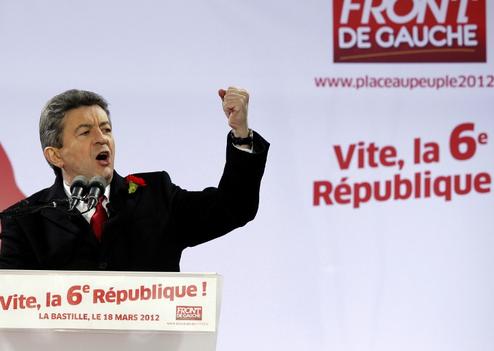Over the weekend, the candidate of the Front de Gauche, Jean-Luc Mélenchon, held a well-attended rally in Paris in front of the Bastille, as if to confirm his arrival as the man of the hour in France’s presidential election.![]()
Once the undisputed leader of both rounds of the presidential election, Parti socialiste candidate and frontrunner François Hollande now faces an ascendant rival on his left flank who is now taking just over 10% of the first-round vote in polls, even as moderate candidate François Bayrou continues to hold steady in polls with between 10% and 15% of the first-round vote.
With the Parti communiste français so withered that even former candidate Robert Hue has endorsed Hollande, Mélenchon — himself a former Parti socialiste member who had clashed in the past with Hollande — has consolidated the far left to a degree not seen in a generation. The last time a far-left candidate won in excess of 10% in the first round of a presidential election was 1981 under Georges Marchais, so a double-digit finish would itself be a milestone.
No wonder the left cheers Mélenchon every time he grittily attacks Front national candidate Marine Le Pen.
In reality, though, none of Mélenchon, Bayrou or Le Pen have the kind of momentum that vaunted Le Pen’s father into the second round of the 2002 race or that put Bayrou himself into real contention in the 2007 race. Hollande — for now — is in no trouble of falling out of the top two spots in the first round, and polls show that he’s maintained a smaller, but nonetheless still double-digit lead over Sarkozy in the second round. So why should he worry?
A first-round loss would be a stinging fall from prior expectations — it would risk transforming the campaign from a referendum on incumbent Nicolas Sarkozy to a narrative emphasizing doubts about Hollande, just as the election would be turning into a two-man showdown. In contrast, at the beginning of the campaign, it appeared that Sarkozy would be struggling with an ascendant Le Pen and a vindictive foe in former prime minister Dominique de Villepin. De Villepin dropped out late last week, however, and since announcing his reelection, Sarkozy has made immigration the focus of his campaign, somewhat co-opting Le Pen’s message.
Furthermore, if the Mélenchon campaign continues to gain attention and support, Hollande will face an unwelcome choice: get boxed out further toward the center as more first-round voters migrate to Mélenchon or take increasingly left-wing positions.
After going nearly two decades without wining a presidential election, there is some pressure for Hollande to take a balanced approach to ideology — one of the main reason he defeated Martine Aubry for the PS nomination. Moreover, his campaign has already taken some stridently leftist steps, and moving further left could cost him credibility. His call to revisit the terms of the European Union fiscal compact has already united several European leaders in active support for Sarkozy’s reelection. He has also mounted a full-throated populist attack against the greed of global finance, his call for a 75% millionaire’s tax on income in excess of €1,000,000 is much further left than anything that the U.S. Democratic Party, the U.K. Labour Party or even Germany’s Sozialdemokratische Partei Deutschlands would propose.
Part of Hollande’s problem is personal style — he will never be able to out-Mélenchon Mélenchon in the way that Sarkozy seems to be outflanking Le Pen. When Sarkozy throws rhetorical bombs, it’s something he’s been doing his whole career — call it dishonesty or call it dexterity, it’s long been a part of the Sarkozy political playbook. Not so with Hollande, whose image is more “Mr. Average” than firebrand.
Finally, part of it is simply positional: a longshot candidate like Mélenchon cannot actually win the presidency. That reality gives him the ideological freedom to present an indulgently leftist platform — re-nationalization of certain sectors of French industry, rejection of the EU’s current swoon for budget austerity, calling a referendum on nuclear power, supporting the legalization of immigrants, reducing the power of the French presidency, and so on.
Hollande cannot pull far left because he’s the odds-on favorite to become the next president. For the same reason, you can’t imagine Hollande taking the fight to Le Pen because Hollande is not running to score points with the left. He’s running to win.

One thought on “Mélenchon storms the Bastille”